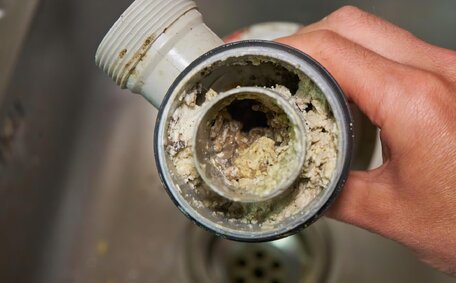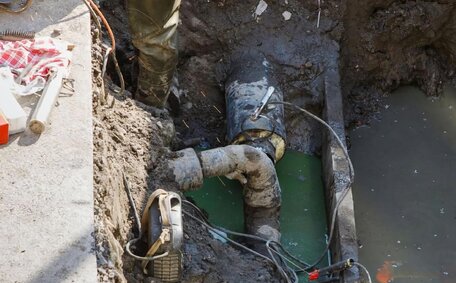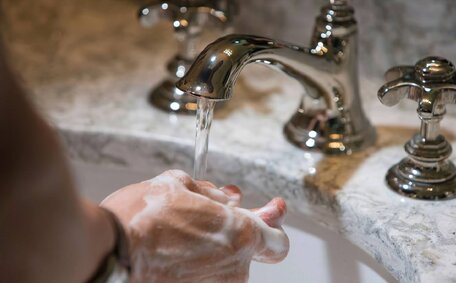Understanding Limescale Buildup
Limescale is the accumulation of calcium and magnesium, deposited by hard water, within your plumbing. These minerals cling to surfaces, leading to scale buildup that may require plumbing interventions.
This hard, off-white lime scale deposit, primarily calcium carbonate, can cause a gradual clogging of pipes, a reduction in water pressure, and make appliances less efficient. In water heaters and boilers, hard water may interfere with heat transfer and lead to premature system failures due to settled minerals. Limescale buildup in your home tends to accumulate fastest in regions where hard water sends mineral-rich water down drain systems.
Installing water softeners to remove excess minerals can mitigate hard water’s detrimental effects on your plumbing system. Installing scale inhibitors helps combat blocked shower heads and using acidic solutions like a vinegar and baking soda mixture can effectively clean your fixtures.
Ensure job thoroughness when you regularly flush pipes and check the drain cover, as doing so can also benefit from measures on cleaning your affected appliances to help curb mineral build-up. Regular inspections of your pipes and fixtures are essential to understand and prevent damage from mineral buildup, highlighting the importance of optimised plumbing services.
What Causes Limescale?
Limescale, chiefly caused hard water, is rich in minerals such as calcium and magnesium. When hard water is heated, these minerals come out of solution and deposit as limescale on surfaces like pipes, fixtures, and appliances, This demonstrates how drains can be affected by high mineral content.
Regions like North Mead in Sydney are affected by hard water, which can greatly impact plumbing systems. Areas rich in sedimentary rock and limestone, which affect both potable and storm water, are prone to harder water that readily leads to limescale accumulation.
With water evaporation inside hot water systems, kettles, steam irons and beyond, the calcium buildup your pipes and appliances along with magnesium becomes evident. In cooling systems, the process of heating up like in central heating, cyclic heating, and cooling concentrates minerals, causing rapid scale buildup.
Regular servicing of your plumbing is crucial to prevent mineral deposits from hard water that lead to limescale and blockages. It’s best to service these areas where hot water contacts surfaces, like pipes, water heaters, your shower head, and tap fixtures, due to rapid limescale accumulation.
Installing a water softener removes calcium and magnesium before they enter your home plumbing. Adopting a routine for descaling appliances or choosing to install water treatment devices contributes significantly to remove limescale efficiently.
Where Does Limescale Tend to Accumulate?
Limescale can do its accumulating predominantly where hot water contacts surfaces within your drainage system. Some of the most common spots where residents put down various substances include:
- Water heaters - Limescale readily builds up inside the tank, affecting both drains and pipes as minerals precipitate out when heated.
- Pipes - Hot water pipes develop gradual mineral deposits over time. Scale often forms first at joints and bends.
- Faucets and showerheads - Openings and aeration screens easily clog with limescale from hot water contact.
- Toilets - Mineral deposits accumulate in toilet tanks and reduce flush performance.
- Washing machines – Frequent heating cycles promote limescale formation on internal elements, such as pipes and valves.
Understanding the causes of limescale and how to maintain affected fixtures, such as kettles, steam irons, and dishwashers, is vital as they are prone to frequent buildup. The cyclic heating causes minerals to rapidly precipitate into drain systems.
Inspecting areas vulnerable to limescale in your bathroom and other parts of your plumbing system helps to remedy standing water by detecting buildup in your fixtures at an early stage; consequently, detecting buildup in your pipes ensures their maintenance. Ensure you descale your drains, showerheads, and faucets, and apply descaling solutions annually to prevent accumulation. Promptly making a call professional for systematic descaling can thwart significant limescale accumulations and avert blockages.
How Limescale Can Lead to Blocked Drains
Limescale mixed with grease can progressively narrow pipes, reducing water flow and heightening the risk of blockages. Industry statistics show limescale and tree roots are primary causes of blockages in drains pipes, contributing to over $500 million in plumbing damage annually in Australia.
Understanding how drains can be safely managed and treated, including those of the outside drain, is essential, as limescale-induced narrowing of pipes makes it easier for soap scum, hair, grease, and other debris to get ensnared. both drains and pipes in places such as the shower, your kitchen sink, and outside can become notably prone to this gradual cause of drain blockages.
Limescale adheres to warm surfaces where hot water flows, causing drainage issues in pipes and fittings. The steady accrual of minerals constricts the water pipe opening over time, eventually restricting the passage of water.
Installing water softeners and using water conditioning products are proactive measures that can prevent blockages and keep drains clear. To thwart blocked drains how you manage your water matters; fitting a water softener is an effective strategy. We also advise on the professional cleaning of blocked drains; knowing how to address limescale is key, so clear any debris ideally on an annual basis before it solidifies.
Slow drainage or backflow requires prompt attention from our professional plumbing service team to address potential blockages. The sooner our team can carry out the work, the lower the risk of enduring blockages, making it easier to unblock drain effectively. Our fast and effective high-pressure water jetting services restore full pressure and flow in your plumbing fixtures.
Signs Your Drain is Blocked by Limescale
There are a few warning signs that may indicate limescale in your drain is becoming blocked due to gradual build up:
- Be alert to any delay in water draining from sinks, showers, or bathtubs, as this could be a sign of blockage.
- Gurgling sounds from pipes need prompt addressing to ensure uninterrupted water flow and avoid further issues.
- Toilets requiring multiple flushes to clear the bowl, a sign that you should notice any changes that might suggest increased mineral deposits.
- Bubbling overflows when a tap is running.
- Bad odours emanating from drains.
Noticing these indicators warrants fast action, necessitating emergency plumbing intervention from services like North Mead Plumbing for specialised drain cleansing. Attempting to figure out how unblock limescale blockages yourself with drain cleaners is not advised, as this can frequently exacerbate the issue.
Our team can use state-of-the-art hydro jetting equipment for the most effective drain cleaning. This pressure-washing method is the ideal solution for removing stubborn limescale deposits while keeping pipes intact.
Our expertise extends beyond drain inspection; we provide guidance on effective limescale prevention to avert future issues. Prompt detection of buildup is critical and can help, so call us at the initial sign of diminishing drain flow to avoid a complete blockage.
Preventing and Removing Limescale Buildup
Let’s examine the most effective strategies to prevent and eliminate limescale buildup in your plumbing system:
- Install a water softener - These units can also reduce the presence of calcium, magnesium, and other minerals that cause limescale, This keeps your pipes clear.
- Consider a limescale prevention system, such as vinegar and lemon juice solutions or magnetic/electronic water conditioners, to control scale while preserving beneficial minerals.
- Clean with vinegar baking - An overnight soak in white vinegar will help to dissolve limescale in your showerheads efficiently. You can also try running this vinegar baking soda solution through pipes.
- Utilise lemon juice or citric acid - Blended with water to create an efficient descaling solution for limescale-vulnerable pipes drains, such as kettles.
- Apply a paste made from baking soda, water, and vinegar to effectively scrub off deposits and prevent blocked drains.
- Have professional hydro jetting - We use specialised equipment to pressure wash limescale from pipes.
- Descale your water heater - Annual flushing and limescale removal maintains efficiency.
- Upgrade with scale-resistant parts - Choose appliances and fixtures with technology to reduce mineral buildup.
To thoroughly avert limescale troubles, you’ll need to consider a comprehensive water softener system, which stands as the best method for the majority of North Mead homes. For removing moderate buildup, you might need DIY options like vinegar if done regularly.
But how do I know I am faced with a severe limescale blockage?', or wish to maintain scale-free plumbing, your local professional maintenance services are essential. Contact North Mead Plumbing to schedule annual descaling or get a water softener installed.
When to Call a Professional plumbing and gas experts
While minor limescale buildup can often be addressed with DIY methods like vinegar, severe blockages that need plumbing expertise are a job for professional plumbing services like those offered by North Mead Plumbing.
If your taps and showers have reduced pressure, or you notice gurgling noises or overflowing drains, these could be severe limescale indicators, and you should contact us immediately.
Our licenced, fully insured plumbers have the advanced tools and years of experience needed to fix problem areas with limescale clogs swiftly:
- Utilising high-pressure hydro jetting can unblock your pipes while ensuring they remain intact.
- Techniques like electronic pipe inspection or a plumber’s snake help locate blockages.
- Drain augers mechanically dislodge obstructions.
Our services include thorough drain cleaning, water heater descaling, pipe insulation, and water softener installation, the primary method for preventing limescale.
For substantial plumbing dilemmas instigated by limescale accumulation, entrust our plumbing experts to restore flow and protect your plumbing system. Call us at 1300 349 338 or email [email protected] to schedule an appointment. Our skilled team is ready to address any limescale-related challenges.






